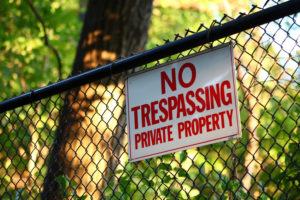If you are caught trespassing on private property you can face civil consequences but in most cases it will be charged as a criminal offense. Many people in California do not understand the ins and outs of this charge. Whether you’ve been charged with criminal trespass or a related offense, such as burglary, we encourage you to read on and then contact Law Office of Michael L. Fell at (949) 585-9055 for a free legal consultation.
The legal definition of criminal trespass
In order to be guilty of criminal trespass, a person must have either entered or remained on a person’s property without authorization. This requires that a person had the intent to commit criminal trespass, which means they knew they did not have permission to go on the property or that they knew that they were not longer allowed on the property. As a result, if a person accident wanders on to another person’s property while out for a walk, it would likely not be considered criminal trespass.
It also requires that there is either a warning or notice. Some states actually require that there is a warning present in order for a person to be charged with trespassing, unless the owner directly tells the person in question that they must leave their premises. Other warnings that legally preclude a person from entering property include signs saying there is no trespassing, fences, and locked doors.
Potential penalties for a conviction of criminal trespass
Criminal trespass is often considered a theft crime because it is related to burglary but it is generally a lesser crime. It may be a misdemeanor or an infraction. In some states it can be a felony under the right conditions. How seriously it will be treated and how serious the consequences are will depend on the specifics of the case.
For example, the law is harsher toward people who illegally enter a home than those who commit other types of criminal trespass. Conviction of entering another person’s home without their permission can lead to up to a year in jail and fines of up to $500. Other types of criminal trespass into nonresidential buildings can result in 90 days in prison and fines of up to $250 while lesser charges are charged as infractions and result in just a fine of up to $250.
You should contact an attorney if you have been charged with criminal trespass
If you are charged with just a misdemeanor and are looking at no jail time then you may be tempted to plead guilty and move on with your life. Remember that having a misdemeanor on your record could affect your ability to get professional licenses and security clearance. If you are charged with a crime in the future, then your past misdemeanor charge could lead to harsher punishment. In short, you should talk to an attorney before pleading guilty. Reach out to Law Office of Michael L. Fell at (949) 585-9055 for a free legal consultation.


